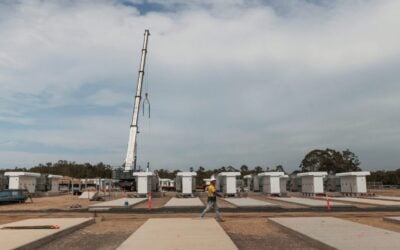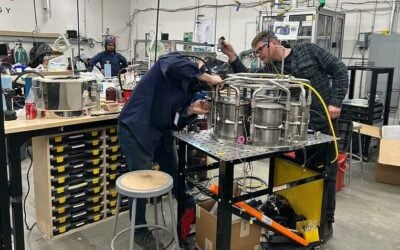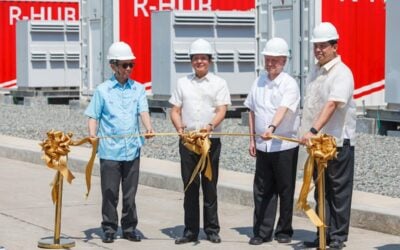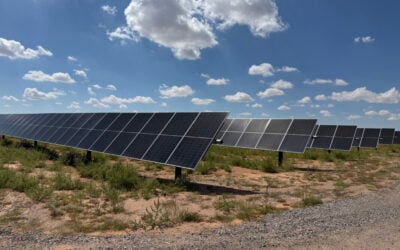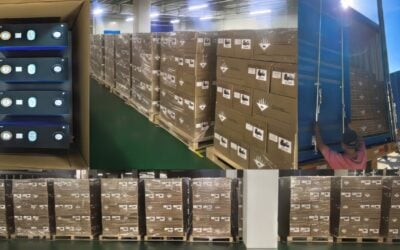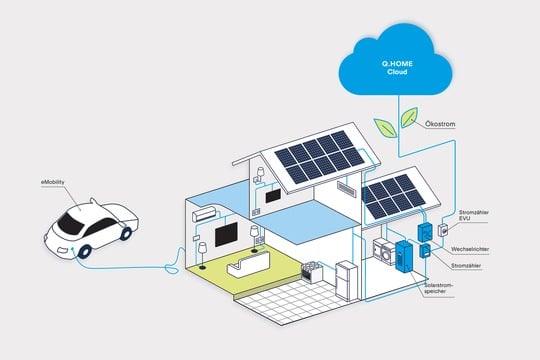
Integrated solar solutions company Q CELLS has officially launched a home solution that promises a “100% sustainable power supply,” through combining solar and battery storage to meet the majority of demand and a digital cloud solution to cover the rest.
Now available in Germany and expected to be “shortly” rolled out into other markets, the Q CELLS Q.HOME Cloud can either be added to new solar PV systems or retrofitted to existing systems. Customers can basically use the Cloud to connect to renewable energy generation in Germany and Austria and use it to source the remaining portion of energy that their solar-plus-battery system is unable to provide. The company says it adjusts the available and expected quota of energy to meet the size and location installation of each solar system and storage unit, claiming in a release sent today that “every customer receives a tailor-made, transparent and fair cloud solution”.
The early days of solar energy becoming a popular choice for homeowners in Germany and much of the rest of the world saw PV systems feed energy directly into the grid and the homeowner paid for the electricity in the form of feed-in tariffs (FiTs). Increasingly, feed-in tariff policies are ending or the sums paid are falling in price as governments phase FiTs out, making the self-consumption of solar energy the logical choice, partly enabled by the falling cost of home battery storage.
While residential solar and storage purchases are often an environmental decision or a decision made of the desire for energy dependence, in parts of the world where electricity is expensive, self-consumption can offer an opportunity to get system payback over time.
Try Premium for just $1
- Full premium access for the first month at only $1
- Converts to an annual rate after 30 days unless cancelled
- Cancel anytime during the trial period
Premium Benefits
- Expert industry analysis and interviews
- Digital access to PV Tech Power journal
- Exclusive event discounts
Or get the full Premium subscription right away
Or continue reading this article for free
In some parts of the world including Germany, system owners can still receive some FiTs – albeit at reduced prices than before – for feeding surplus energy into the grid once their battery is full. In Japan, for example, new rules expected to come into effect in the next few years will stipulate that self-consumption must be achieved and only the surplus after demand is met can receive the feed-in tariff.
The company hopes there will be appeal for customers in the fact that for a monthly fee, whole houses’ electricity demand can be met with “100% eco-friendly electricity from your solar system or via the Q.HOME Cloud”. The Q.HOME Cloud can be paid for by monthly subscription. The Cloud solution is compatible with a solar array from any manufacturer, although it does need to be paired with Q CELLS solar storage equipment.
The solution has been teased to the market for a while: at last summer’s Intersolar Europe exhibition Energy-Storage.news / PV Tech spoke with Q CELLS expert specialist sales application engineer Cyril Hinz about it in detail in the video posted above.
Hinz called it a “holistic system for the end customer,” and that the company expected households to be able to meet around 70% of their demand with onsite generated solar and the battery to store it. The remaining 30% could be sourced from the Q.HOME Cloud subscription. in the video Cyril Hinz also talks about the different AC-coupled and DC-coupled home battery energy storage options available from Q CELLS.

